Exchange Building / Court House (later Supreme Court) [1843-1921]
Primary tabs
Submitted by annelisec on Sat, 2011-04-30 09:59
Current condition:
Demolished / No longer exists
Date Place completed:
1843-01-01
Date Place demolished:
1921-01-01
"Reports of Her Majesty's Colonial Possessions" - 1848
Court house was occupied.
In the photo below, the Court House is center with the columns.
http://upload.wikimedia.org/wikipedia/commons/1/1a/QRC_court_1880.jpg

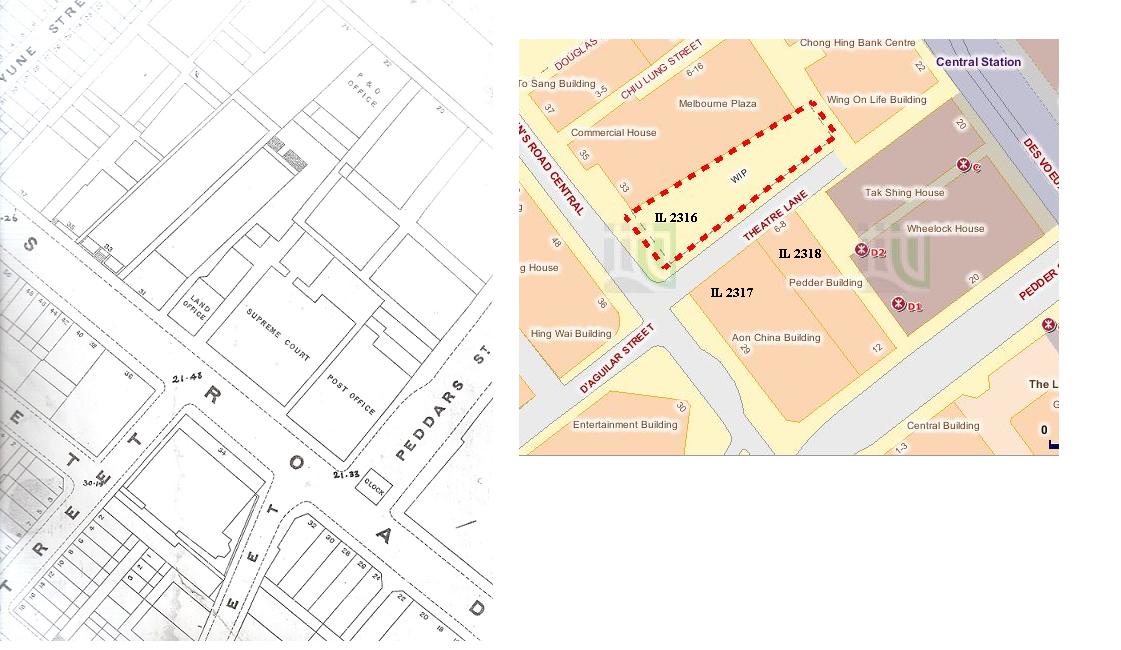
Tags:
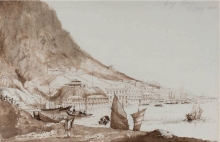
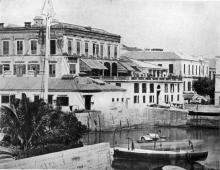
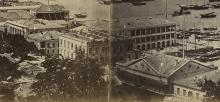

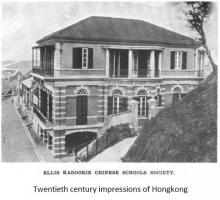
Comments
1848?
The building in the photo looks very grand, as thought it would have been built later than 1848. No firm evidence, but I guess that "The Court House was occupied" could refer to another site, or an earlier building on this site.
I've moved the marker for
I've moved the marker for this place. It was on today's Melbourne Plaza, now it's just East of the junction with D'Aguilar Street, so it agrees with the 1889 map shown above.
Thanks to Jessica for pointing out the mistake.
Regards, David
1909 Junction of Queen's Road Central and D'aguilar Street
View of the Junction of Queen's Road Central and D'aguilar Street. The Court House is on the right.
Earlier Construction Date?
The Supreme Court House, formerly the Old Exchange Building, situated next to the General Post Office, was purchased from a merchant firm in 1847. During the Sessions which commence their sittings on the 18th of every month, a peep into these, generally to be avoided precincts, may interest the sightseer.
Source: The Tourist's Guide to Hong Kong, with short trips to the Mainland of China … (1897) by HURLEY, R. C.
I would push the construction bate back to 1843 and add the Old Exchange to the Location.
According to Sayer the
According to Sayer the Supreme Court opened three days before Bonhams arrival in Hong Kong. Bonham was appointed as governor on the 21st March 1848, but was that his arrival date in the colony? The basement of the court was used as a temporary church until St Johns was ready for service. Prior to moving the Supreme Court had occupied a warehouse at the junction of Wellington and D'Aguilar street.
3rd Location of HK Court/Supreme Court
A brief history of the old Court Houses of the Colony is therefore in order. We find that the Supreme Court has been housed in three different buildings. It was first situated in Wellington Street, being opened on October 1, 1844. In 1848 it was removed to what was then known as Exchange Building, in Queen's Road, on part of the site of the present China Building, and opposite what is now the King's Theatre, The Exchange Building had belonged to Dent and Co., and was purchased by the authorities in 1847, it was here that the Chamber of Commerce first blossomed forth, as the Court remained in its second premises until the completion of the present Courts of Justice, which were opened in 1912.
On several occasions the Court had to delay its sittings owing to the necessity of repairing the Queen's Road| building and: in August, 1892 it had once more to transplant its domain to allow of urgent modifications in the edifice and the tribunal sat temporarily in the Masonic Hall in Zetland Street.
It might be noted that the building which housed the Supreme Court for so many years .in Queen's Road, was originally known as Exchange Building and formed one of the oldest premises in the Colony, being for some, time in the possession of Messrs. Dent and Co., who sold the building to the Government in 1847. It had (for those times) an imposing front, with a colonnaded portico and at the time of its demolition about eleven years ago was nearly eighty years old
Source: Old Hong Kong by Colonial Vol 1
List of Barristers/Solicitors in 1891
The Hongkong Telegraph of September 3 1891 published a list of barristers-at-law and solicitors then practising in Hongkong. It seems fairly obvious that the list was compiled by Mr. Robert Frazer-Smith, editor of the Telegraph. Mr. Frazer-Smith had good reason to be well-acquainted with the legal profession of Hongkong for he made regular appearances in the Supreme Court, mostly for the purpose of contesting libel actions. The following is an expurgated-version, of Mr. Fraiser-Smith's article which he headed " The Local Devil's Own ".
John Joseph Francis, Q.C. is Hongkong's leading counsel .and one of its most prominent citizens. He served with distinction in the Army, and having acquired a taste for the Bar whilst serving Her Majesty, elected to serve behind it, and by sheer hard work and natural ability succeeded beyond his most sanguine expectations. It is popularly supposed that to have Francis on your side means a winning case with the special or exclusive order of Hongkong jurymen. He is a warm-hearted man in his own fashion has done a lot of good for a certain class in Hongkong.
Andrew John Leach, acting Attorney-General ( late of Drummond and Leach, Shanghai } is a good all-round cricketer a sportsman and painstaking lawyer a stickler for emoluments and chiefly known and appreciated here by his services to the Colony in connection with the law Revision Committee. He has been a useful and valuable stop-gap to the Government when the appointments of Magistrate, Attorney-General and Puisne Judge were vacant.
The Hon. Mr. Ho Kai is a lawyer as well as a Bachelor of Medicine and is a member of the Legislative Council. He passed creditable examinations in England and Scotland; married an English lady whose premature death prompted the founding of the Alice Memorial Hospital. A keen supporter of the Gambling Ordinance and Anti-Share Bill a clever shrewd and capable lawyer a gentleman scholar philanthropist and good man.
Edward Robinson is patient and painstaking. On one occasion whilst acting Magistrate he fined the Editor of the Hongkong Telegraph $10 for refusing to answer an impudent question but was afterwards amenable to the voice of reason. A plodding lawyer who is gradually making headway against difficulties, a capital lightweight boxer, and a good all round sportsman, Mr. Robinson has a future before him in the Colony.
Henry Edward Pollock is a great nephew of the famous Chief Baron of that name whom he resembles in style and delivery slow and ponderous. It is said that Mr. Pollock's written opinion on cases involving intricate points of law is the most valuable in the Colony
George Jeckyl Phillippo, with the prestige and reputation of his worthy Uncle's name behind him, is chiefly remarkable for his fortunate investments in a well-known Philippine Island enterprise, now alas, under a cloud in Hongkong. Mr. Phillippo has plenty of natural ability and for a comparatively yound man, has a fairly comprehensive knowledge of legal matters. As an after dinner speaker he is an undoubted success.
Wei Piu is the youngest of the horsehair wig division and one of the cleverest. He does not practice his profession although a member of the local Bar. He is well off, wears spectacles, could play football in his school days and although the wearer of a queue is very much an Englishman in ideas and modes of thought.
Arthur Bulmer Johnson Crown Solicitor is a tall and austere man, head of the firm of Johnson, Stokes and Master.
Alfred Parker Stokes, Acting Crown Solicitor is another partner in the firm of Johnson, Stokes and Master. He was caught with the Company mania last year, and is a director of several local limited liability companies especially in connection with British North Borneo. He was once a good athlete and a graceful high jumper. To-day he is one of the popular " mashers " and a decent all-round fellow". Mr. Stokes is a much better lawyer than many rivals, with far greater pretensions.
Godfrey Cornwall Chester Master is the third partner in the above-mentioned firm. He is an amateur race rider and a fairly good oarsman. G.C.C.M. is .Secretary of;, the Victoria Recreation Club
Henry Gedge is the managing clerk, to that well-known trio of legal lights Johnston, Strokes and Master. He is a 'genial young lawyer, gifted with consummate assurance and evidently knows his business. He is a very clever feather-weight gladiator and is well liked whenever he is known.
William Wotton ( Wotton and Deacon ) has been many years in this Colony and is considered to be the Poland of the local Police Court. He is a prominent director of the National Bank of China and other successful institutions. In his public capacities he is chiefly noted for his loud and sonorous voice, penetrating glance and persuasive manner. Mr. Wotton knows, his profession thoroughly and his line of country has always been respectable.
Victor Hobart Deacon is another partner in the firm of Wotton and Deacon. He is the leading conveyancer in the Colony and is a thorough gentleman. It is only necessary to add that such do not grow profusely upon gooseberry bushes in this part of the world.
John Hastings, clerk, to Wotton and Deacon, does most of the hard work for the firm and does it well. He is a slow speaker but generally manages to get there just the same.
C. T. Wilkinson, The Rupert of Debate is a popular man with the Chinese, a good lawyer and courteous to everybody. His Lord Dundreary style occasionally excites amusement.
Creasy Evens is a lawyer who gained considerable local experience as Clerk to the Chief of Justice. He is reputed to have greater weight with the Chinese than any lawyer in the Colony but this may be owing to the fact that Chinese are credited with having a good deal of sway in his business. Mr Evens is said to have gained a vast knowledge of the working of public companies while General Manager of the Green Island Cement Company. He is a careful lawyer, with a well balanced mind, but is somewhat reserved
VJ. F. Reece is a partner of Mr. Evens. He is somewhat faddish and is remarkable for his white umbrella. Invariably he may be found in a brown study of abstruse legal problems.
Henry Lardner Dennys (Dennys and Mossop) another Hong kong lawyer is supposed to.be the most level-headed of the crowd. He is Honorary Secretary to the City Hall. We have paid his firm at various times sufficient costs to enable him to retire.
William Henry Ryan Mossop, Mr. Dennys' partner is a man with a reputation. He is a trifle hard of hearing but is a capable lawyer. He is also a well known naturalist.
Henry John Holmes is a lawyer with decided military proclivities. He is a warm supporter of the local volunteer movement and at one time was an enthusiastic and capable officer of the Corps.He is fond of horticulture and is famous as a practical gardener. Homes' cabbages are a renowned local delicacy. He is a keen supporter of Kowloon progress and one of the earliest pioneers of that settlement; Mr. Holmes is a careful and reliable lawyer whose good name has always been above suspicion and who is respected by all who know him.
Arthur Bernard Rodyk is the son of a distinguished and successful lawyer in the Straits. His legal experience is said to be good, but much of his time.is taken up with public companies.
Ho Wyson is our only Chinese solicitor. Educated in England he is a thoroughly well read lawyer but is handicapped in court practice by bashful modesty and a deficiency in what is known as " the gift of the gab." He is also handicapped in general business by his phenomenally limited office hours. It is a joke in legal circles that Wyson's hours are from twelve to three with an interval of one hour.for tiffin
John Francis Webber is at present out of practice, and but lately returned from a lenghy visit to Australia, he is the noblest Roman of them all.
More about HK Lawyers here
Source: Old Hong Kong by Colonial Vol 1